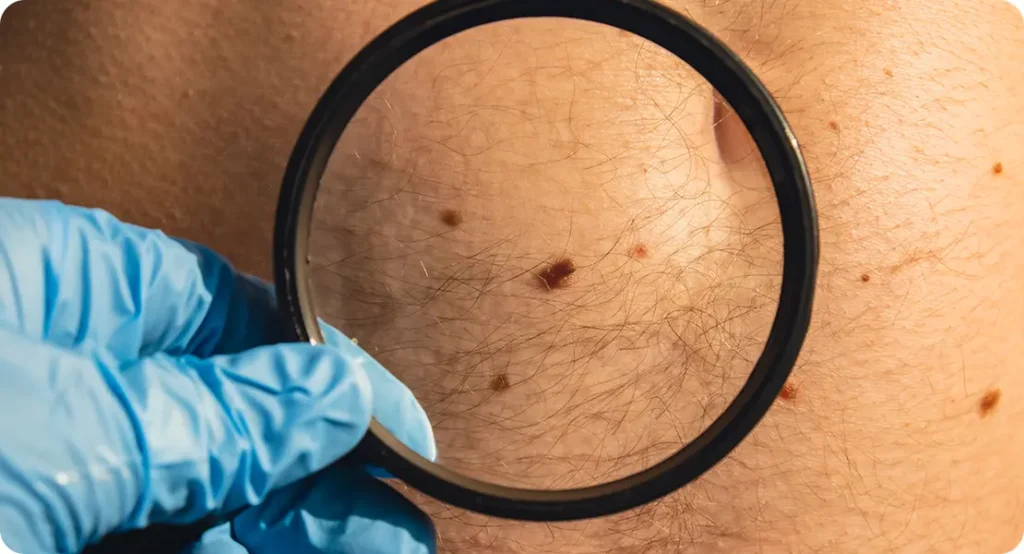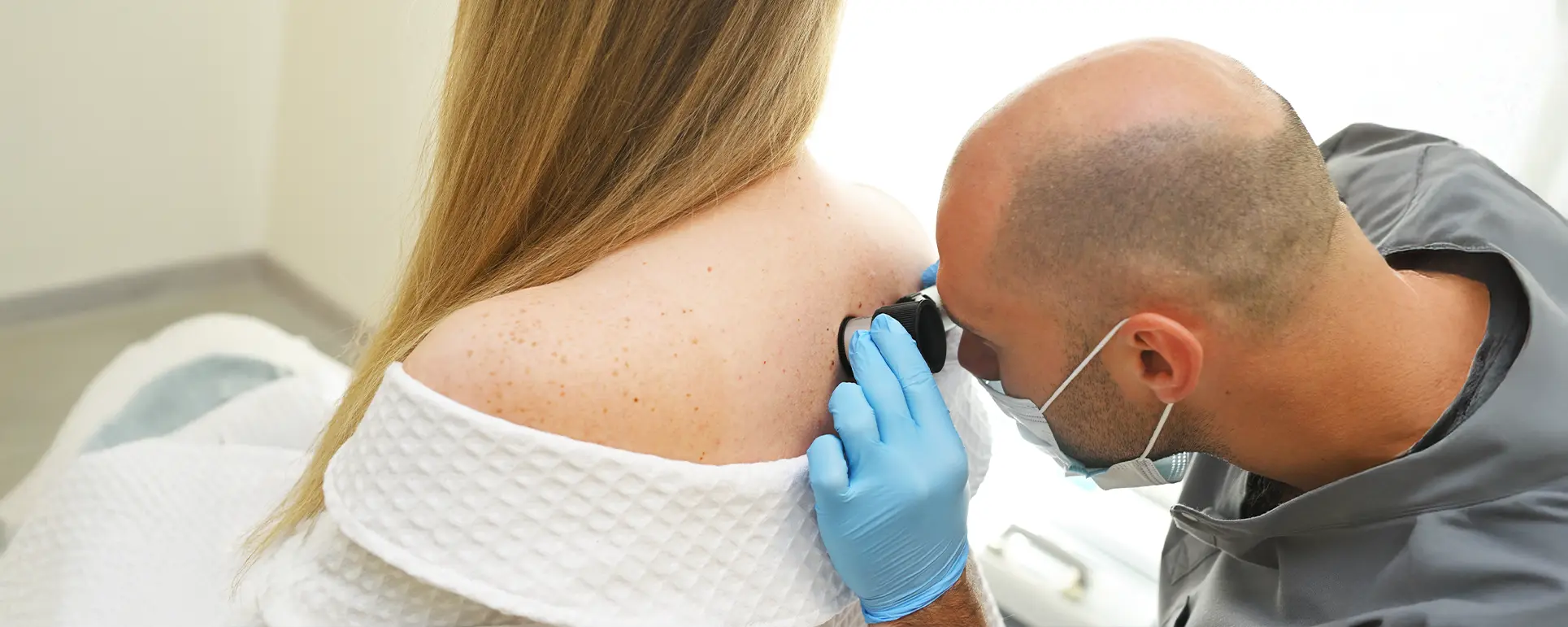If you’ve noticed a mole changing shape, developing an irregular border, becoming darker, or just looking different from the rest it’s natural to feel anxious. Maybe it itches, bleeds, or has appeared suddenly without warning. In situations like this, waiting around for answers can feel incredibly stressful.
Skin cancer is one of those medical conditions where early detection can make a significant difference. In fact, catching it early can be the key to simpler treatment, fewer complications, and a better overall outcome. But here’s the problem: the current wait times to see an NHS dermatologist can be lengthy, sometimes stretching into several months. And if you’re already feeling uneasy, that wait can feel unbearable.
That’s where private dermatology comes in. Choosing to go private doesn’t just mean shorter wait times it can also mean faster access to diagnostic tools like mole mapping, biopsies, and expert clinical assessments, all without delay. It can lead to a faster diagnosis, quicker treatment decisions, and just as importantly faster peace of mind.
When it comes to something as serious as skin cancer, speed matters not only medically, but emotionally too. The uncertainty of not knowing what’s happening with your skin can take a real toll on your mental well-being. By seeing a private dermatologist, you’re giving yourself the chance to act sooner, worry less, and take back a sense of control over your health.
Why Time Matters in Skin Cancer Detection
When it comes to skin cancer, time truly is of the essence. The earlier it’s found, the better the chances of treating it successfully with minimal intervention. Skin cancer includes several types such as melanoma, squamous cell carcinoma, and basal cell carcinoma each with its own characteristics and risks. But across the board, one thing remains true: early detection significantly improves outcomes.
Melanoma, for instance, is the most aggressive form of skin cancer. It can grow quickly and spread to other parts of the body if not caught in time. But when detected early before it penetrates deeper layers of the skin it can often be completely removed with a simple surgical procedure. That’s a potentially life-saving difference.
Squamous cell carcinoma also becomes more dangerous the longer it’s left untreated. Although it doesn’t spread as rapidly as melanoma, it can still invade deeper tissues and lead to disfigurement or complications if not addressed promptly. Early treatment means smaller incisions, fewer side effects, and a quicker recovery.
Basal cell carcinoma is the most common and typically the least aggressive skin cancer, but that doesn’t mean it should be ignored. If caught early, it’s usually very straightforward to treat. However, if left too long, it can grow large, damage surrounding tissue, and require more complex surgery or reconstruction.
Quick action also reduces the emotional burden. Waiting months to find out whether a mole or skin lesion is dangerous can cause considerable mental distress. Even if the result is benign, that prolonged uncertainty can affect your sleep, your focus at work, and your overall peace of mind.
Here’s why acting quickly truly matters:
- Early-stage melanomas can often be completely removed, preventing serious complications
- Basal cell carcinomas, when treated promptly, are less likely to grow and affect surrounding tissue
- Squamous cell carcinomas caught early are less likely to spread or become disfiguring
- Faster diagnosis means less anxiety, especially if the mole turns out to be non-cancerous
In short, speed doesn’t just save lives it can save you from unnecessary worry, more invasive procedures, and longer healing times.
NHS Wait Times for Dermatology Appointments

The NHS provides essential care to millions, and for urgent, life-threatening conditions, it can be incredibly responsive. However, when it comes to dermatology, the reality is that it often falls lower on the list of healthcare priorities especially if the concern doesn’t appear immediately serious. And unfortunately, many forms of skin cancer don’t always look alarming in the early stages, which can lead to significant delays in being seen.
If you’ve visited your GP with concerns about a mole or unusual skin lesion, and it’s not flagged as an urgent cancer risk, you may be referred to a general dermatology clinic under a routine category. These routine referrals can involve waiting several weeks, or even months, just for the initial consultation. And if your case requires further testing such as mole mapping, dermoscopy, a biopsy, or imaging that wait time can be extended even further.
In many cases:
- Routine dermatology referrals can take anywhere from 6 to 18 weeks depending on your local NHS trust and demand
- Diagnostic imaging or biopsies are subject to availability and may be scheduled weeks after your first appointment
- If your referral isn’t classified as urgent, you’ll likely be placed on a standard waitlist, even if you’re anxious about the potential risk
To make matters worse, even when a skin concern is referred under the NHS’s two-week urgent cancer pathway, some patients still report delays due to backlogs and staffing shortages. And during busy periods such as winter or post-holiday months non-urgent referrals may be postponed altogether.
While the NHS continues to do its best with limited resources, these delays can feel incredibly frustrating, especially when you’re concerned about something as serious as skin cancer. For many people, the idea of waiting months for answers just doesn’t sit right. That’s one reason why more individuals are turning to private dermatologists for faster, more flexible care.
How a Private Dermatologist Can Speed Things Up
When you’re worried about a mole or skin lesion, the last thing you want is to be stuck waiting. Choosing to see a private dermatologist can drastically reduce those waiting times and streamline every step of the diagnostic and treatment process. It’s not just about speed it’s about getting answers, reassurance, and care when you need it most.
Here’s how going private can accelerate your path to diagnosis and, if needed, treatment:
1. Same-Week Appointments
Unlike NHS services, where you may have to wait weeks or even months for an initial consultation, private dermatologists often offer appointments within days. Many clinics provide same-week availability, and some even offer same-day consultations, especially if your case is urgent. This means you can get a professional opinion much faster, giving you quicker peace of mind or faster action if something is wrong.
2. Faster Skin Checks
Once you’re in the consultation, private dermatologists can perform a full skin check right away. Using a dermatoscope a specialised magnifying tool with a polarised light they can closely examine moles, freckles, and other skin lesions for irregularities. This detailed visual analysis helps dermatologists identify signs of melanoma and other skin cancers early, often within minutes. You won’t be asked to come back weeks later for this step it’s typically done during your very first visit.
3. Immediate Action on Suspicious Lesions
One of the major advantages of private care is how quickly it moves from assessment to action. If the dermatologist spots something suspicious during your appointment, they may be able to:
- Perform a biopsy on the spot, with no need to return at a later date
- Schedule an excision (surgical removal of the lesion) within just a few days, rather than weeks
- Refer you directly to an oncologist or specialist, without the administrative delays common in the public system
This proactive approach removes unnecessary waiting, which is especially valuable if a lesion turns out to be malignant.
4. Faster Lab Results
Waiting for biopsy or histopathology results can be one of the most stressful parts of the process. In the NHS, this stage can sometimes take 2–4 weeks or longer. Private dermatology clinics usually work with dedicated private laboratories that offer priority processing and faster turnaround times. In many cases, you could receive your results in as little as 3 to 5 working days, which allows for quicker decision-making about next steps.
5. Streamlined Communication and Follow-Up
In a private setting, you often get direct access to your dermatologist for follow-up questions, results discussions, and care planning. Whether it’s by phone, email, or follow-up appointment, you’re not left in the dark. This kind of continuity of care helps ensure that nothing gets lost in the system and that you feel supported throughout the process.
What to Expect from a Private Consultation

If you’ve never had a private dermatology consultation before, you might be wondering what the experience will actually involve. The good news is that private appointments are typically thorough, relaxed, and highly personalised. The dermatologist will take the time to understand your concerns, examine your skin in detail, and guide you through the next steps with clear explanations no rushed decisions or long gaps between appointments.
Here’s what usually happens during a private skin check consultation:
Full medical history review
Before the examination begins, your dermatologist will talk through your medical background. This includes any personal or family history of skin cancer, your general health, medications you’re taking, and any previous skin conditions or treatments. If you’ve spent a lot of time in the sun, used tanning beds, or had frequent sunburns in the past, this will be noted, as these are all important risk factors.
Close examination of all concerning areas
You’ll be invited to point out any specific moles, growths, or marks that are bothering you. The dermatologist will then carry out a close inspection of those areas, checking for any features that could indicate abnormal or cancerous changes. If you’re worried about broader skin health or if you’re at higher risk, you may also opt for a full-body mole mapping session, where all your moles are digitally documented and reviewed.
Dermatoscopic imaging and evaluation
During the examination, the dermatologist will often use a dermatoscope a handheld magnifying device with polarised light to take a detailed look at your skin. This allows them to see deeper into the layers of a mole or lesion, identifying early signs of skin cancer that may not be visible to the naked eye. In some cases, images may be taken and stored for future comparison, helping to track changes over time.
Discussion of next steps based on findings
Once the examination is complete, the dermatologist will talk you through their findings in simple, straightforward terms. You won’t be left guessing or waiting for a letter in the post. They’ll explain:
- What type of lesion it appears to be (e.g. benign mole, actinic keratosis, potential melanoma)
- Whether removal or biopsy is advised, and why
- Your treatment options, including what each one involves
- How soon procedures can be booked, often within days
Direct, tailored advice for your skin health
In addition to diagnosing specific concerns, your dermatologist may offer general advice on how to protect your skin going forward. This might include UV protection tips, skincare recommendations, or ongoing monitoring plans if you have multiple moles or are considered high-risk.
Who Should Consider Going Private?

Deciding whether to go private for a skin concern can feel like a big step but in many cases, it’s a proactive and sensible one. If you’re feeling uneasy, stuck on a long waitlist, or simply want clarity sooner rather than later, booking a private dermatology consultation might be the best path forward.
You don’t need to wait until symptoms become severe or unbearable. Sometimes, acting on a gut feeling or a sense of unease can be what makes all the difference. Here are some situations where seeing a private dermatologist is worth considering:
You’ve noticed rapid changes in a mole
If a mole has started changing quickly in size, shape, or colour or has developed irregular borders, multiple colours, itching, bleeding, or crusting these could be early warning signs of skin cancer. While not every changing mole is dangerous, swift evaluation is essential to rule out serious concerns.
You have a family history of skin cancer
If skin cancer runs in your family, you may have an increased genetic risk. People with close relatives (such as a parent or sibling) who’ve had melanoma or other types of skin cancer should be especially cautious. Going private allows for more frequent check-ups, detailed mole mapping, and faster action if something looks unusual.
You want peace of mind sooner rather than waiting
For many people, the hardest part is not knowing. If you’re lying awake at night worrying about what a mole might be, waiting several months for an NHS appointment can feel like torture. A private consultation offers the reassurance of a timely professional opinion, which can reduce stress even if the outcome turns out to be completely benign.
You’ve been referred to dermatology but feel the wait is too long
Sometimes, a GP will make a referral to an NHS dermatologist, but the appointment might not come through for weeks or months. In that time, your concern might worsen, or your anxiety may grow. If you’ve already been referred but feel the delay is too long for comfort, going private can bridge that gap and potentially give you a faster diagnosis and treatment plan.
You have multiple moles or are at high risk
If you have lots of moles, fair skin, a history of sunburn, or spend a lot of time outdoors, you may be at higher risk of developing skin cancer. A private consultation can include a comprehensive skin check, digital mole mapping, and advice on monitoring changes over time helping you stay one step ahead.
Choosing to see a private dermatologist doesn’t mean you’re overreacting it means you’re taking your skin health seriously. Whether it’s for early detection, faster treatment, or simply peace of mind, there’s no harm in being cautious especially when it comes to something as important as your skin.
How Much Does It Cost?
One of the most common concerns about going private is the cost but in many cases, it may be more affordable than you think, especially when weighed against the benefits of fast access, early detection, and peace of mind.
While prices can vary based on the clinic, location, and specific services provided, most private skin cancer consultations in London typically fall within the range of £200 to £350. This fee usually covers:
- A full medical history review
- A detailed examination of the skin and any areas of concern
- Use of a dermatoscope to assess moles or lesions
- Professional advice on diagnosis and next steps
If further investigation is needed such as a biopsy, mole removal, or histopathology testing these are often billed separately. The cost for a biopsy might range from £150 to £400, depending on the complexity and whether lab analysis is included. Surgical excisions, if needed, may cost anywhere from £300 to £800, particularly if a local anaesthetic or follow-up care is involved.
That said, most private dermatology clinics are upfront about pricing. You’ll usually receive a full breakdown of expected fees before any treatment begins, so there are no surprises. Many offer package pricing for minor surgical procedures, combining consultation, excision, and aftercare into one fixed cost for added clarity.
Benefits Beyond Speed
While quicker access is one of the main reasons people choose private dermatology, the benefits often go far beyond just shorter wait times. Patients frequently find that the overall experience is more personalised, thorough, and reassuring especially in situations where anxiety is high and clarity matters.
Here’s what else you can expect:
- Longer appointment times with in-depth discussion
Private consultations are typically longer than standard NHS appointments. This gives your dermatologist ample time to not only examine your skin thoroughly but also discuss your concerns in detail. You’re encouraged to ask questions and fully understand the options available to you without feeling rushed. - Continuity of care with the same specialist
In many private clinics, you’ll see the same dermatologist from start to finish, which helps build trust and ensures that your care is consistent. This is particularly valuable if ongoing monitoring or multiple procedures are needed, as you won’t need to re-explain your history every time. - Customised follow-up and treatment recommendations
Rather than a generic treatment pathway, private care often includes a tailored plan based on your unique skin type, risk level, and lifestyle. Whether it’s a schedule for mole checks, sun protection advice, or post-treatment skin care, the guidance you receive is made specifically for you.
These personal touches can make a meaningful difference especially when dealing with something as sensitive and potentially serious as a possible skin cancer diagnosis.
Final Thought: The Smart Way to Stay Ahead of Skin Cancer
If you’re concerned about a mole, spot, or skin change, don’t wait in silence. A private dermatologist can often assess you within days, providing quicker clarity and faster treatment when necessary.
You can get in touch with us to book a consultation with one of our expert private skin cancer specialists in London. We’re here to help you take action and protect your health without unnecessary delays.
References
- Dillon, E. et al., 2024.
Nurse‑Led Models of Service Delivery for Skin Cancer Detection: Wait Times Reduced from 66 to 37 Days. Journal of Advanced Nursing. https://onlinelibrary.wiley.com/doi/10.1111/jan.16854 - Calow, C.F. et al., 2021.
Management of the Two‑Week Wait Pathway for Skin Cancer Referrals. British Journal of General Practice. https://pmc.ncbi.nlm.nih.gov/articles/PMC9410100/ - Chuchu, N., Dinnes, J., Takwoingi, Y. et al., 2018.
Teledermatology for Diagnosing Skin Cancer in Adults: A Cochrane Review – Sensitivity 94.9%, Specificity 84.3%. Cochrane Database of Systematic Reviews. https://pmc.ncbi.nlm.nih.gov/articles/PMC6517019
